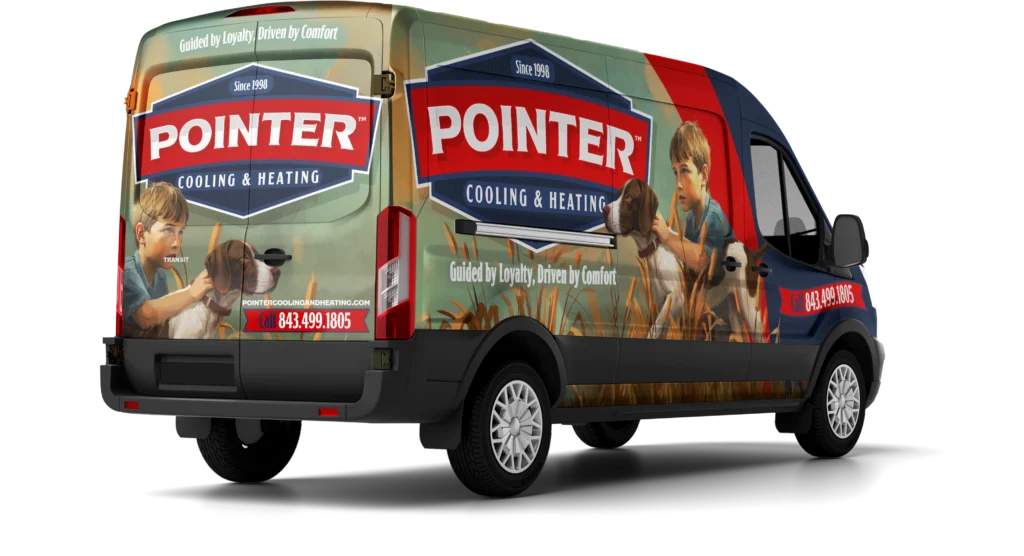If you’re planning to upgrade your HVAC system or building a new home in Moncks Corner, SC, you’ve probably come across the debate of forced air vs central air. Many homeowners assume these systems are the same—but they’re not. At Pointer Cooling and Heating, we often get questions about their differences and which one makes the most sense for South Carolina homes. In this guide, we’ll break down how each system works and help you decide what’s right for your comfort and budget.
What Is a Forced Air System?
A forced air system refers to the method of air distribution in your home. It uses ducts and a blower fan to circulate air—whether that air is heated or cooled. It doesn’t refer to the heating or cooling source itself.
Forced air systems typically include a blower motor, ductwork, return and supply vents, and air filters. These systems can work with furnaces, central air conditioners, or heat pumps. If your home uses ducts and vents to move air into each room, it has a forced air system—even if it only provides heat.
What Is a Central Air System?
A central air system refers specifically to air conditioning. It cools air in a central location—usually using an outdoor compressor and an indoor evaporator coil—and distributes it through your home using ducts. Central air is always a part of a forced air system, but a forced air system doesn’t always include central air.
In other words, a central air system is a specific type of forced air system that’s used only for cooling. It does not provide heat, although it often works in tandem with a furnace that uses the same ductwork.
Forced Air vs Central Air: What’s the Difference?
The biggest difference between forced air and central air is that forced air refers to the method of air distribution, while central air refers to a cooling system. A forced air system can deliver heated or cooled air, depending on what kind of unit it’s paired with. Central air only refers to the cooling part, which depends on a condenser, evaporator coil, and refrigerant lines to cool your home.
If you’re looking to cool your home efficiently, central air is what you want. If you’re referring to how air is delivered, that’s forced air. In most modern homes, both systems work together—your central air conditioner provides cool air, and your forced air system distributes it through the house.
What Type of System Do You Have?
Many homes in Moncks Corner already have a forced air furnace without central air. That means ductwork and a blower are already in place—making it relatively easy to add central air. If your home has an outdoor AC unit and you control your cooling from a single thermostat, you likely have central air. If it only heats, but you still have vents in each room, then you’re working with forced air only.
Still unsure? Our HVAC professionals at Pointer Cooling and Heating can inspect your current setup and walk you through what’s installed and what upgrades are possible.
Which System Is Best for South Carolina Homes?
In a hot and humid climate like Moncks Corner, SC, central air conditioning is essential for summer comfort. But to get that cool air into every room, you need a reliable forced air system. Together, central air and forced air create a complete solution for whole-home comfort.
If you already have ductwork in place, central air is a great next step. If not, or if you want a more modern alternative, ductless mini-split systems or heat pumps may be worth considering. Heat pumps, in particular, can provide both heating and cooling through the same system—making them ideal for South Carolina’s relatively mild winters and warm summers.
Benefits of Forced Air Systems
Forced air systems come with several advantages:
-
Quick temperature changes – Air is pushed quickly through ducts, which helps regulate temperature fast.
-
Improved air quality – Filters can capture dust, allergens, and other airborne particles.
-
Versatility – Works with a variety of heating and cooling sources.
-
Zoning compatibility – You can split your home into zones for better energy control.
Benefits of Central Air Systems
When comparing forced air vs central air, it’s important to consider how much cooling power you need. Central air systems are ideal for homes with high summer temperatures and larger square footage.
Here’s what makes central air stand out:
-
Consistent cooling throughout the home
-
Quiet indoor operation, since the loud components stay outside
-
Humidity control for improved indoor comfort during humid months
-
Energy efficiency, especially with newer high-SEER models
Maintenance Considerations
Both systems require regular upkeep to run efficiently and last longer. With forced air systems, filter replacement is key. Dirty filters can restrict airflow and put unnecessary strain on the system. Ductwork should also be inspected for leaks or buildup.
Central air systems need regular coil cleanings, refrigerant checks, and thermostat calibrations. Ignoring maintenance can lead to higher energy bills and costly breakdowns.
At Pointer Cooling and Heating, we recommend seasonal tune-ups for both systems. Preventative maintenance not only improves performance but also extends your equipment’s lifespan.
Making the Right Choice for Your Home
When deciding between forced air vs central air, the answer often comes down to what you already have installed and what your home needs. Most South Carolina homes use a combination of both—central air for cooling and a forced air system to distribute the conditioned air.
If you’re building a new home or renovating an existing one, talk to our team about your comfort goals, energy efficiency preferences, and budget. We’ll help you find the best solution—whether that’s installing central air, upgrading ductwork, or exploring ductless and hybrid systems.
Call Pointer Cooling and Heating today to schedule a system inspection or get a free estimate on central air installation in Moncks Corner, SC!

